The Growing Intersection of AI, Customer Support, and SEO
In the digital age, businesses strive to enhance user experience while climbing search engine rankings. Leveraging artificial intelligence (AI) to automate customer support is emerging as a powerful strategy to simultaneously improve service quality and SEO signals. This narrative explores how AI-driven automation optimizes customer interactions and transforms SEO outcomes, spotlighting tools, techniques, and trends shaping this dynamic landscape.
Understanding the Role of AI in Automating Customer Support to Enhance SEO Signals

How can AI be used to automate customer support to improve SEO signals?
AI plays a significant role in automating customer support by deploying chatbots and virtual assistants that offer instant responses to user inquiries. These AI-driven tools can handle common questions efficiently, providing timely and accurate assistance that enhances the overall user experience.
Improved user experience directly impacts SEO signals such as increased user engagement, longer page visits, and reduced bounce rates. When visitors find answers quickly and effortlessly, they are more likely to stay longer on the website, share content, and return in the future.
Personalization is another strength of AI in customer support. AI systems analyze customer data and interaction history to deliver tailored responses, making users feel valued and understood. This personalized engagement fosters trust and loyalty, which search engines interpret as signs of relevant and authoritative content.
Furthermore, AI enables 24/7 support availability. No matter the time zone or hour, AI tools ensure that users receive assistance promptly, reducing frustration and encouraging ongoing interaction. This constant accessibility contributes to higher satisfaction levels and positive perceptions of the website’s reliability.
AI tools also monitor customer feedback and query patterns, providing insights that help businesses optimize their content, FAQs, and help resources proactively. By addressing common issues preemptively, companies can improve their support structure and content relevance, positively influencing SEO rankings.
In summary, AI-driven customer support automation enhances SEO signals by increasing engagement, demonstrating responsiveness, personalizing user interactions, and ensuring continuous support. These factors collectively boost a website’s credibility and relevance, key elements in search engine ranking algorithms.
For more insights on AI customer support and SEO benefits, search for "AI customer support automation SEO benefits."
Key Benefits of Integrating AI into Customer Support for SEO Enhancement

What are the benefits of integrating AI into customer support processes to boost SEO signals?
Implementing AI within customer support functions offers multiple advantages that positively influence SEO outcomes. AI-powered systems drastically reduce response times, providing immediate assistance which improves user satisfaction and encourages visitors to stay longer on a website. Personalized interactions powered by AI analyze individual user behavior and preferences, creating tailored support experiences that foster loyalty and increase the likelihood of return visits.
Moreover, AI enhances user engagement metrics such as dwell time and repeat traffic. When users receive relevant, timely support and content recommendations, they tend to explore more pages and spend more time on the site, signaling valuable content to search engines.
From an SEO perspective, AI tools facilitate rapid detection of trending keywords, search intent, and competitor strategies. This enables marketers to update content quickly, optimize keywords, and refine site architecture for better visibility. Routine SEO tasks like keyword research, backlink analysis, and technical audits are automated with AI, saving significant time and allowing teams to focus on strategic growth.
Additionally, AI personalizes on-site navigation and content suggestions based on user data, improving overall user experience. Enhanced navigation reduces bounce rates, while personalized content aligns with search engine algorithms that prioritize relevant and helpful information.
In summary, integrating AI into customer support enhances responsiveness, personalization, and relevance. These improvements lead to increased engagement, better content targeting, and faster adaptation to search engine changes—all contributing to a stronger SEO profile and higher search rankings.
AI Automation’s Impact on Search Engine Rankings and Website Optimization
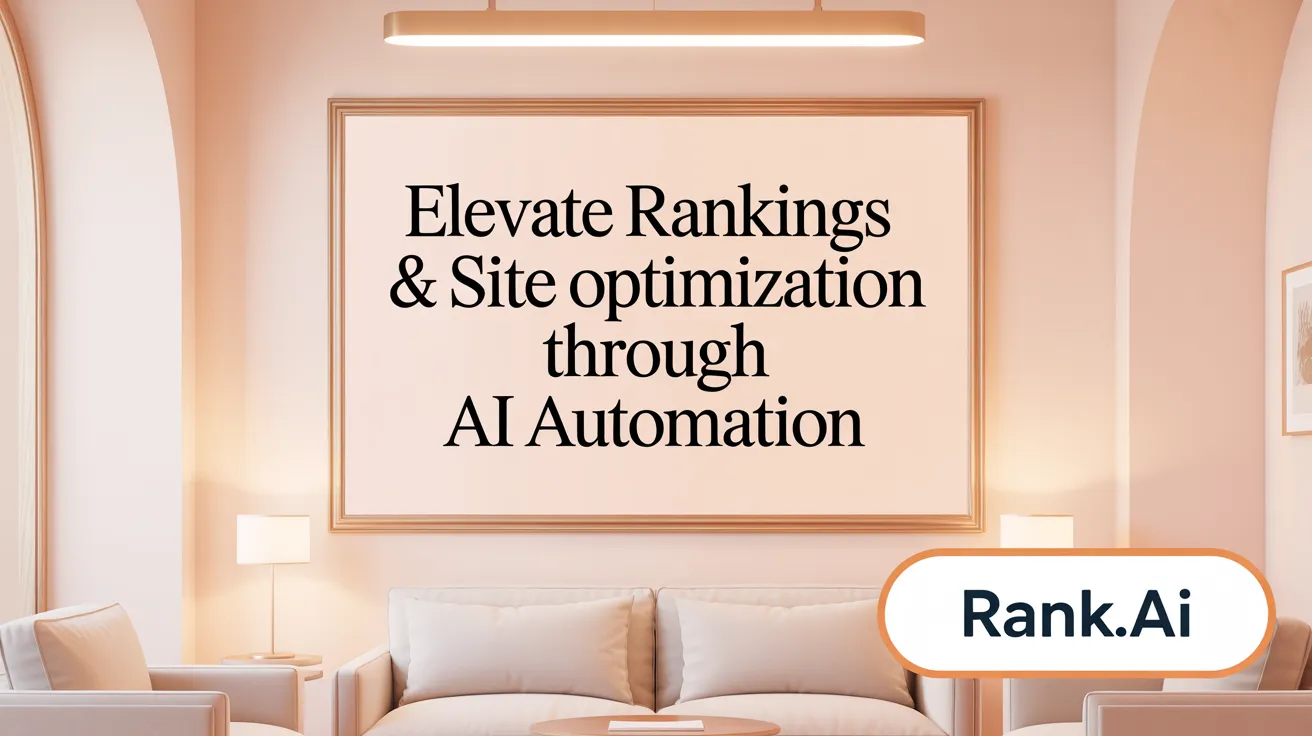
How does AI automation impact search engine rankings and website optimization?
AI automation has revolutionized the way websites perform in search engine rankings. It enhances technical SEO by automating tasks such as site audits, schema markup implementation, and fixing issues like broken links or slow page speeds. This leads to faster and more accurate technical compliance, which search engines favor.
Understanding user intent is also improved through advanced algorithms like Google's BERT and MUM. These AI models analyze vast data sets to better interpret what users want, enabling websites to tailor content that precisely matches search queries. This alignment results in higher relevance and better ranking potential.
Personalized content delivery is another consequence of AI-driven SEO. By analyzing user behavior and preferences, AI tools recommend relevant articles, products, or services, increasing engagement and conversions. AI-powered recommendation engines help websites serve more tailored experiences, encouraging visitors to stay longer and interact more.
Workflow optimization using AI tools drastically boosts productivity. Tools like Semrush, MarketMuse, and Alli AI automate keyword research, content generation, technical audits, and competitor analysis. This automation reduces manual effort, minimizes errors, and speeds up content production cycles, allowing marketers to focus on strategic tasks.
Adapting SEO strategies to AI-generated search features is essential as search engines continue to evolve. Features like featured snippets, knowledge panels, and zero-click searches demand optimized structured data, high-quality content, and authority building. AI aids in structuring content effectively for these features, ensuring visibility in innovative search results.
The combined effects of AI in SEO result in improved visibility, higher-quality traffic, and a more adaptable online presence. However, balancing automation with human oversight is crucial to maintain content quality, authenticity, and ethical standards. Staying ahead in the AI-driven SEO landscape means continuous learning and strategic implementation of emerging AI capabilities.
Influence of Automation and AI on SEO Factors: Ranking, Technical SEO, and Content Quality

How can automation and AI influence SEO factors such as ranking, technical SEO, and content quality?
Automation and AI have revolutionized SEO by making data analysis more precise and efficient. They allow marketers to quickly process vast amounts of information, identifying opportunities that can improve search rankings. For instance, AI tools can analyze competitor websites, keywords, and user behavior to suggest targeted strategies.
In technical SEO, AI automates routine tasks like site audits, detecting broken links, optimizing schema markup, and improving page load speeds. Tools such as Semrush and Alli AI help streamline these processes at scale, ensuring websites adhere to best practices that search engines favor.
Content relevance and user engagement also benefit greatly. AI examines top-performing pages and understands user intent, enabling the creation of content that meets specific audience needs. It supports keyword research by predicting trending topics and aligning content with what users are searching for.
Several AI-powered SEO tools like ChatGPT, Surfer SEO, and MarketMuse facilitate these improvements by suggesting content outlines, optimizing metadata, and analyzing KPIs in real-time. These tools enhance the quality and relevance of content, helping sites rank better and attract more visitors.
Emerging features such as Google's Search Generative Experience demonstrate AI’s role in transforming how search results are presented through instant, AI-generated answers. While these innovations offer new opportunities, maintaining ethical standards, transparency, and compliance with Google’s quality guidelines like E-E-A-T (Experience, Expertise, Authoritativeness, Trustworthiness) are vital.
Overall, AI and automation make SEO more data-driven and scalable, helping businesses achieve higher rankings while delivering valuable, high-quality content that aligns with user expectations.
AI-Driven Strategies and Tools That Propel SEO Outcomes Through Automation

What AI-driven strategies and tools can enhance SEO outcomes through automation?
Implementing AI in SEO involves leveraging sophisticated software and platforms designed to automate critical tasks, making the process faster, more accurate, and highly scalable. Advanced AI tools like Semrush, Koala AI, Indexly, and SEO.AI empower marketers to conduct comprehensive keyword research, generate optimized content, and execute detailed technical site audits automatically.
These tools use machine learning algorithms to analyze vast amounts of data, uncover high-value keywords, and predict search trends. By doing so, they align content strategies with the evolving algorithms, enhancing relevance and visibility. For instance, Semrush offers AI-assisted keyword clustering and competitor analysis, while AI content generators help craft high-quality drafts tailored to audience intent.
Technical site audits powered by AI swiftly identify issues such as broken links, slow-loading pages, or schema markup errors. Automated fixes streamline website health maintenance, allowing marketers to focus on strategic planning.
Predictive analytics and search trend forecasting further refine SEO efforts. AI models analyze user behavior and search patterns to forecast shifts, enabling preemptive optimization. Chatbots and AI-driven user engagement tools also enhance on-site experience, increasing dwell time and reducing bounce rates, both important factors for improving Google rankings.
Effective AI integration involves responsible application—ensuring compliance with search engine policies—to maximize return on investment. These automated workflows save time, reduce manual errors, and lead to better data-driven decisions, making AI an indispensable element of modern SEO strategies.
| Tool Name | Main Function | How It Supports SEO | Additional Features |
|---|---|---|---|
| Semrush | Keyword research, site audit | Identifies ranking opportunities, tracks competition | Content templates, AI Copilot |
| Koala AI | Content generation and optimization | Creates SEO-friendly content ideas and drafts | NLP-based keyword integration |
| Indexly | Technical audit and fixing | Detects and resolves technical issues quickly | Schema markup, page speed improvements |
| SEO.AI | Integrated SEO automation | Automates keyword clustering, content optimization | Custom dashboards, predictive SEO insights |
Using these tools effectively enables businesses to craft data-driven, dynamic SEO strategies that adapt quickly to market and algorithm changes, ensuring sustained visibility and growth.
Emerging Trends and Techniques in AI for Customer Support and SEO Enhancement

What are the current trends and techniques in using AI for customer support and SEO enhancement?
AI is transforming how businesses enhance customer experience and optimize search engine rankings. One of the most prominent developments is the widespread use of conversational AI and advanced chatbots. These AI-powered tools provide round-the-clock support, handle customer inquiries efficiently, and understand natural language with high accuracy. This means customers get instant responses, regardless of time or language barriers, boosting satisfaction and reducing operational costs.
In addition, sentiment analysis is increasingly integrated into support platforms. AI analyzes customer feedback, comments, and social media mentions to gauge emotions and opinions. This real-time insight helps companies personalize responses and proactively address issues, creating seamless omnichannel interactions across websites, social media, and messaging apps.
On the SEO front, AI techniques lead with smarter keyword research and content generation. Machine learning models analyze vast data sets to identify high-value, long-tail keywords and predict search intent. Content tools leverage generative AI to craft optimized drafts, topic outlines, and meta descriptions tailored for user interest and search engines.
Predictive analytics and hyper-personalization are also key trends. These technologies allow marketers to forecast customer needs and deliver highly relevant content and offers. They help in customizing website experiences based on user behavior patterns, thereby increasing engagement and conversions.
AI tools automate routine SEO tasks such as technical audits, backlink analysis, and on-page optimization. This automation frees up human resources for strategic activities, accelerates project timelines, and improves accuracy. As a result, organizations stay competitive by swiftly adapting to changing search engine algorithms.
Looking ahead, voice and visual search are poised to become dominant. Innovations in these areas aim to optimize content for AI-driven answers and multimedia searches. Ethical AI use and transparency are also gaining importance, ensuring AI systems are fair, understandable, and trustworthy.
Overall, the future of AI in customer support and SEO will involve continuous innovation in automation, personalization, and ethical practices, making digital interactions more efficient, relevant, and user-centric.
How AI Analyzes Customer Data to Optimize Content and Support Resources
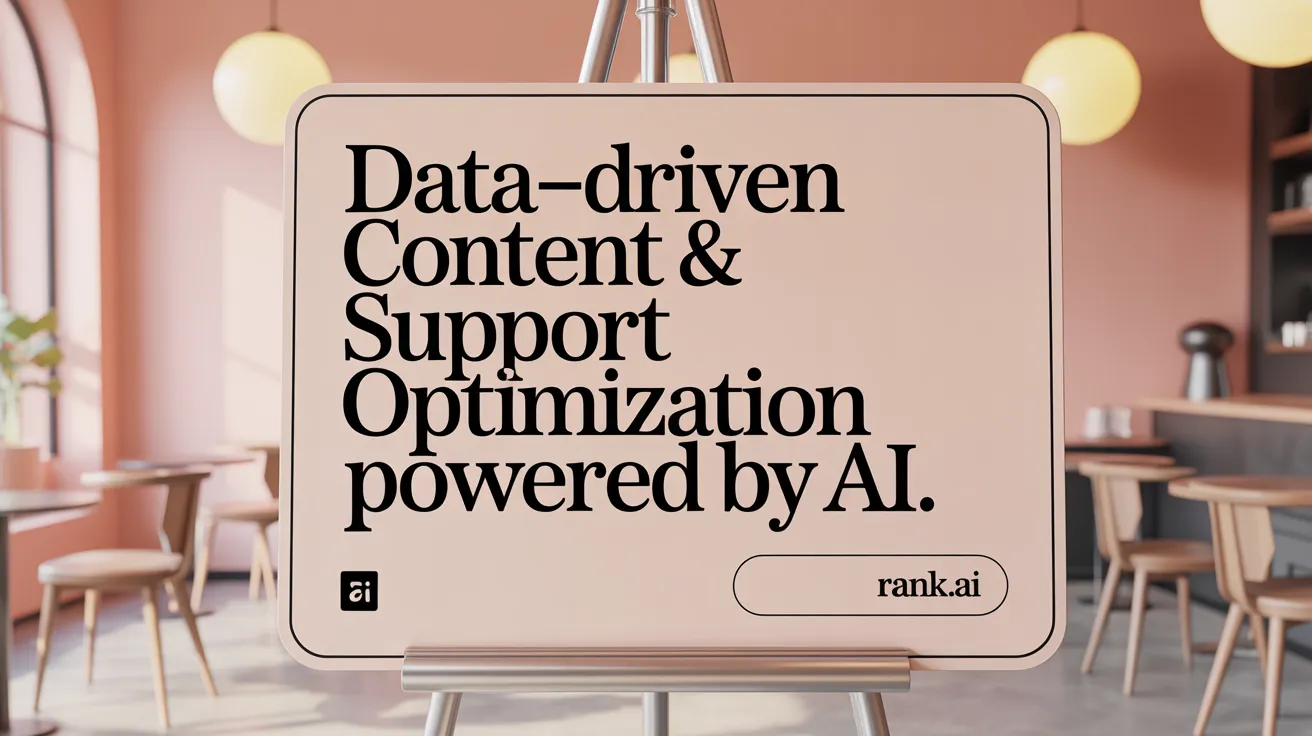
How does AI-driven analysis of queries and feedback improve SEO and support?
AI uses advanced algorithms to examine large volumes of customer queries, feedback, and interactions across various platforms. This analysis helps identify common patterns, trends, and sentiment, providing insights into what users are searching for and their main concerns. By understanding these patterns, AI enables businesses to optimize their website content and support resources in ways that are more aligned with actual user needs.
How can AI help in identifying frequent customer issues?
AI tools automatically sift through customer interactions to pinpoint recurring problems or questions. For example, if many users struggle with a specific feature or face common technical issues, AI highlights these areas of concern. This proactive identification allows companies to address issues more effectively, improve their FAQ sections, and create targeted content that reduces user frustration and improves search rankings.
In what ways does content optimization get informed by customer data?
Customer feedback provides valuable clues about what keywords and topics are most relevant. AI analyzes these insights to suggest new keywords, enhance existing content, and tailor messaging to meet user expectations. This data-driven approach ensures that content is highly relevant, increases its visibility in search results, and ultimately drives more traffic and conversions.
How does AI enhance support resources using insights from customer interactions?
AI enhances support systems through the creation of intelligent FAQs, chatbots, and self-service portals. By analyzing common questions and feedback, AI-generated content becomes more relevant and comprehensive. This reduces the load on human support teams, offers immediate assistance to users, and provides personalized, context-aware responses that improve customer satisfaction.
What are the benefits of using AI for SEO through proactive content improvements?
Using AI for continuous content analysis and update enables marketers to stay ahead of changing search trends and user preferences. This proactive approach leads to higher search engine rankings, increased organic traffic, and better user engagement. Additionally, AI-driven insights help brands respond quickly to new issues or opportunities, making their SEO strategies more agile and effective.
Leveraging AI Chatbots Across Channels to Boost User Engagement and SEO

Deployment of AI chatbots on websites and social media
AI chatbots are now being deployed across various digital channels, including websites, social media platforms, and messaging apps. This widespread integration allows businesses to maintain a constant digital presence, providing immediate assistance to visitors and followers. By embedding chatbots on their websites, companies can handle customer inquiries efficiently, while social media bots engage users directly where they prefer to communicate.
Instant response capabilities and 24/7 service
One of the main advantages of AI chatbots is their ability to respond instantly to user queries anytime, day or night. This round-the-clock availability enhances user satisfaction and keeps visitors engaged longer on a site or platform. For SEO, improved engagement metrics like dwell time and reduced bounce rates signal to search engines that a website offers valuable, user-friendly content.
Personalization of conversations and onboarding assistance
AI chatbots leverage natural language processing (NLP) to personalize interactions based on user inputs. They can tailor conversations to match individual preferences, suggest relevant products or content, and assist with onboarding processes seamlessly. Personalized experiences not only elevate user satisfaction but also increase conversion rates, indirectly boosting a site’s SEO by fostering loyalty and positive interactions.
Integration with messaging apps and support platforms
To maximize outreach, AI chatbots are integrated with popular messaging apps such as WhatsApp, Facebook Messenger, and Slack. This multi-channel approach enables businesses to meet users on their preferred platforms, offering quick responses and support across multiple touchpoints. Such integration enhances the user experience and builds a cohesive digital presence that benefits overall SEO by maintaining consistent engagement.
Impact on dwell time and bounce rates for SEO
Effective AI chatbot deployment significantly influences key SEO metrics. Instant and relevant responses encourage visitors to stay longer on a site, increasing dwell time—a positive ranking factor. Additionally, by providing immediate assistance and guiding users through their journey, chatbots help reduce bounce rates. These improvements in user interaction data contribute to better search engine rankings, as they indicate a website’s relevance and usefulness.
| Aspect | Benefit | Example |
|---|---|---|
| Deployment channels | Multi-platform presence | Chatbots on websites, Facebook, WhatsApp |
| Response speed | Enhanced user satisfaction | Instant replies reduce wait time |
| Personalization | Increased engagement | Tailored recommendations based on user behavior |
| Metrics impacted | Improved SEO signals | Longer dwell time, lower bounce rate |
AI-Powered Sentiment Analysis for Enhancing Personalization and SEO Impact
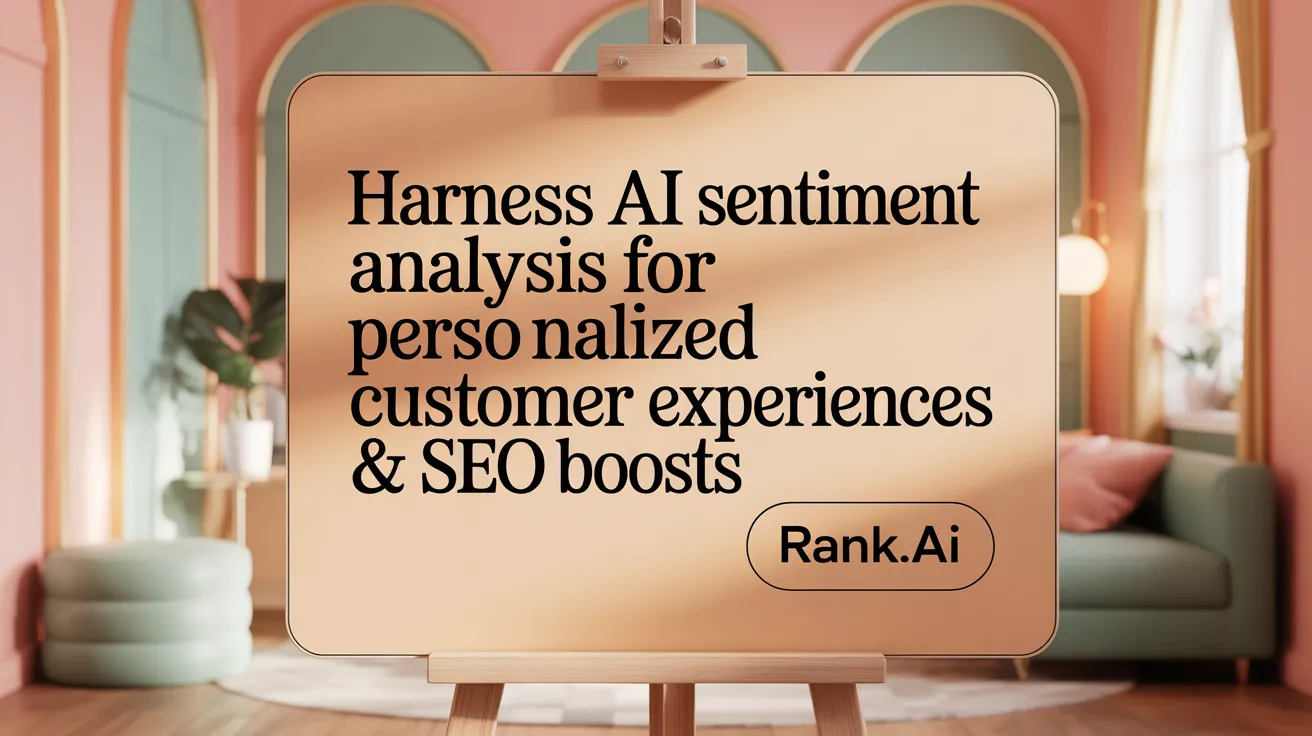
How AI detects customer emotions and feedback
AI sentiment analysis uses natural language processing (NLP) to evaluate customer comments, reviews, and interactions across digital channels. By analyzing tone, word choice, and context, AI can identify whether the sentiment is positive, negative, or neutral. This allows businesses to quickly understand how customers feel about their products or services in real time.
Improving personalized user experiences
With sentiment data, AI helps personalize website content, recommendations, and support. For example, if a customer expresses frustration, an AI system can trigger a tailored response or direct them to helpful resources. Conversely, positive feedback can be used to showcase testimonials or promote related products, creating a more engaging and relevant experience.
Proactive issue resolution driven by sentiment data
Sentiment analysis enables companies to detect potential problems early. If AI flags a string of negative responses or complaints, customer support teams can intervene proactively, resolving issues before they escalate. This approach not only improves customer satisfaction but also prevents negative impacts on SEO by maintaining positive online reputation signals.
Influences on customer loyalty and site metrics
Consistently positive sentiment strengthens customer loyalty and encourages brand advocacy. Positive user interactions increase dwell time, reduce bounce rates, and generate more user-generated content—all factors favoring higher search rankings. Conversely, addressing negative feedback promptly helps protect a site’s reputation, indirectly benefiting SEO performance.
Consequences for SEO performance and rankings
Search engines value user experience signals, including reviews, feedback, and overall sentiment. High positive sentiment can lead to richer snippets, better star ratings, and higher click-through rates, boosting rankings. On the other hand, widespread negative sentiment can harm a site’s visibility. Therefore, leveraging AI sentiment tools is vital for managing reputation and optimizing SEO outcomes.
Self-Service Portals Enabled by AI: Empowering Customers and Supporting SEO
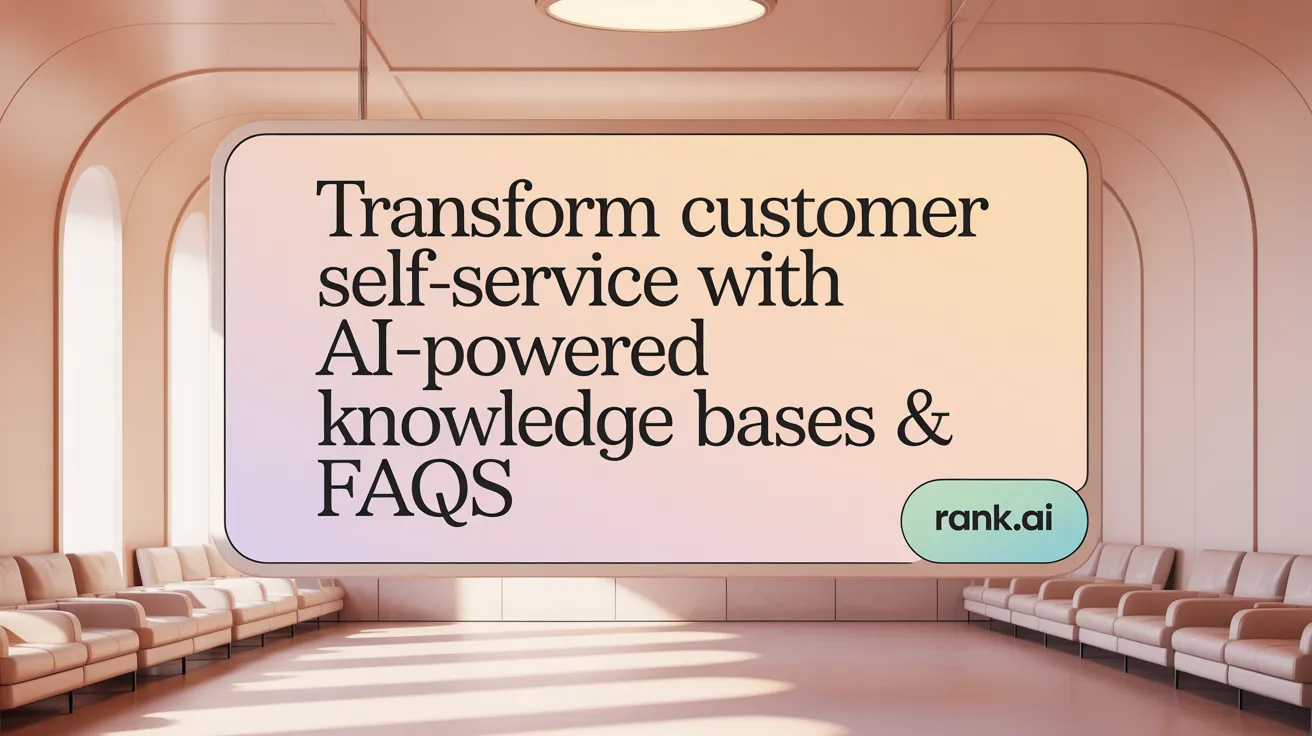
How do AI-powered knowledge bases and searchable FAQs improve customer self-service?
AI-powered knowledge bases and searchable FAQs allow customers to find answers quickly by providing instant access to relevant information. These portals use natural language processing (NLP) to understand user queries and deliver accurate, useful responses, making the experience seamless.
How do they help reduce dependence on human agents?
Automated self-service options decrease the need for customers to wait for human support, resolving common issues independently. This not only saves time for users but also reduces the workload on customer service teams, enabling human agents to focus on more complex problems.
What benefits do these portals bring to SEO?
Self-service portals enhance SEO by increasing user engagement and lowering bounce rates. When customers spend more time exploring helpful content, search engines interpret this as a sign of valuable content, which can improve page rankings.
How do these features improve user satisfaction?
By offering quick, autonomous access to information, AI-driven knowledge bases empower users to resolve their issues promptly. Enhanced satisfaction leads to positive brand perception and fosters loyalty, while also attracting more organic traffic through improved search visibility.
| Aspect | Benefit | Additional Detail |
|---|---|---|
| Functionality | Instant answers | AI analyzes queries and matches them with relevant content in knowledge bases, FAQs, and guides |
| Impact on Support | Less reliance on live agents | Automation handles routine inquiries, reducing wait times |
| SEO Improvement | Increased engagement | Longer site visits and lower bounce rates signal quality to search engines |
| User Satisfaction | Autonomy and speed | Users solve problems independently, boosting satisfaction and trust |
Leveraging AI in self-service portals not only streamlines customer support but also enhances website authority and ranking, making it a vital component in modern SEO strategies.
Using AI to Consolidate Omnichannel Customer Data for a Seamless Experience
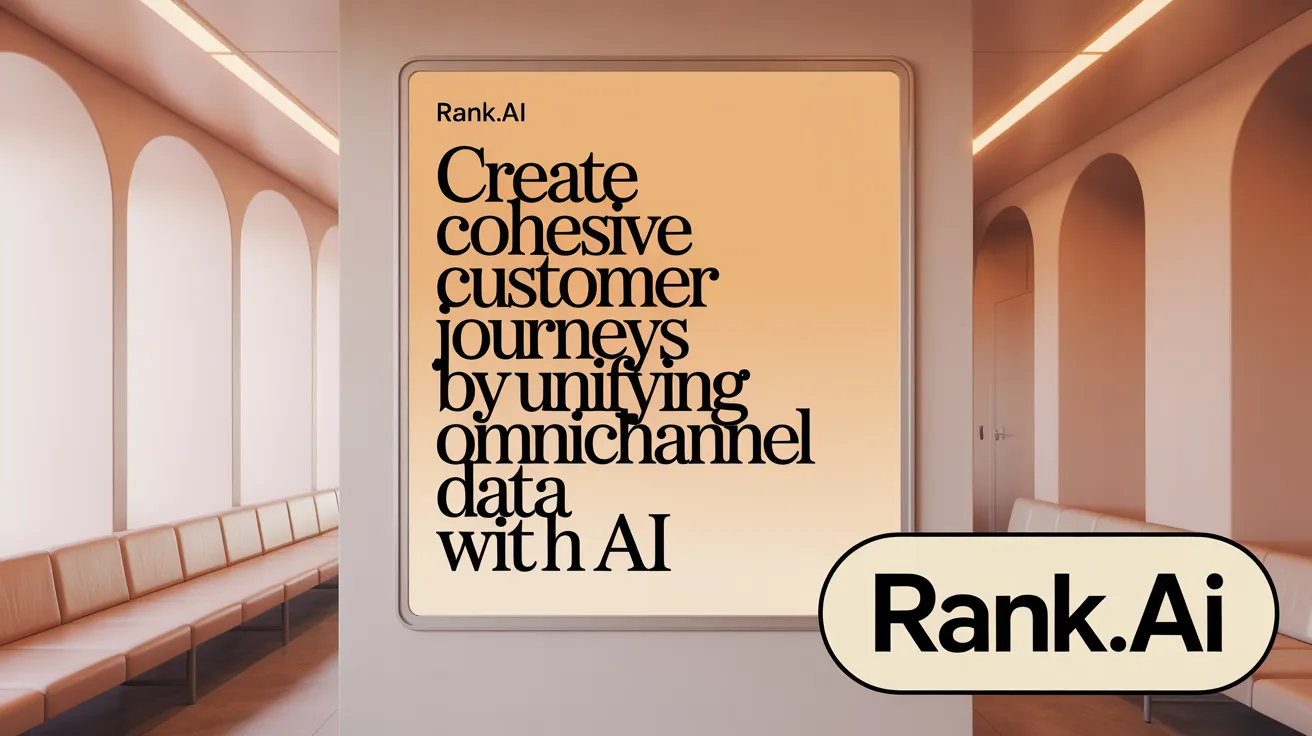
Combining data from various communication channels
AI-driven solutions enable businesses to collect and unify customer data across multiple platforms, such as websites, social media, messaging apps, and email. These tools automatically aggregate interactions, preferences, and feedback, creating a comprehensive view of each customer.
Providing consistent support and information
With AI, companies can deliver uniform and accurate information regardless of the contact point. This consistency builds trust and ensures that customers receive the same high-quality support whether they inquire via chat, email, or social media.
Improving personalization and user journey understanding
AI analyzes the integrated data to personalize experiences effectively. It identifies patterns in user behavior, preferences, and previous interactions, helping brands tailor content, offers, and support, leading to more engaging and relevant customer journeys.
SEO advantages from cohesive user experiences
Search engines value user engagement and satisfaction. When AI integrates data to present seamless and personalized experiences, websites benefit from improved metrics like reduced bounce rates and increased dwell time. This cohesiveness can positively influence search rankings.
Enhanced analytics for ongoing optimization
AI-powered analytics platforms compile real-time data from all channels, offering insights into customer needs, pain points, and trends. These insights enable continuous, data-driven adjustments to marketing strategies, enhancing both customer experience and SEO performance.
Real-Time Language Translation with AI to Expand Global Reach and SEO

How does AI-driven multilingual support enhance global SEO?
AI-driven language translation tools enable websites to communicate effectively with users around the world. By offering real-time translation, AI helps businesses reach diverse audiences in their native languages, making content more accessible.
How does breaking language barriers improve customer service?
AI-powered translation supports seamless communication across languages, allowing customer service chatbots and support portals to handle inquiries in multiple languages automatically. This reduces wait times and improves customer satisfaction.
What is the impact on user experience for international visitors?
Visitors are more likely to engage with content that is presented in their language. AI translation ensures that international users can understand and navigate websites easily, leading to increased engagement, longer visits, and higher conversions.
How does this support SEO strategies?
Serving content in multiple languages improves visibility in regional search engines. AI translation helps optimize multilingual keywords, enhances local relevance, and boosts rankings in countries with different languages.
How does AI-powered translation support global brand visibility?
By maintaining consistent messaging across languages and regions, AI translation enables brands to establish a stronger global presence. It also enhances reputation and authority in international markets.
| Feature | Benefit | Additional Details |
|---|---|---|
| Multilingual Support | Expands audience reach | Supports numerous languages through NLP |
| Real-Time Translation | Improves user engagement | Offers instant language conversion |
| SEO Optimization | Boosts regional rankings | Enables multilingual keyword targeting |
| Customer Service | Enhances user experience | Facilitates prompt, localized responses |
| Brand Visibility | Strengthens global presence | Consistent messaging across regions |
As AI continues to evolve, real-time language translation will play an even larger role in how businesses optimize for international search and improve user experience across borders.
Performance Analytics Platforms Powered by AI for Continuous Customer Service Improvement
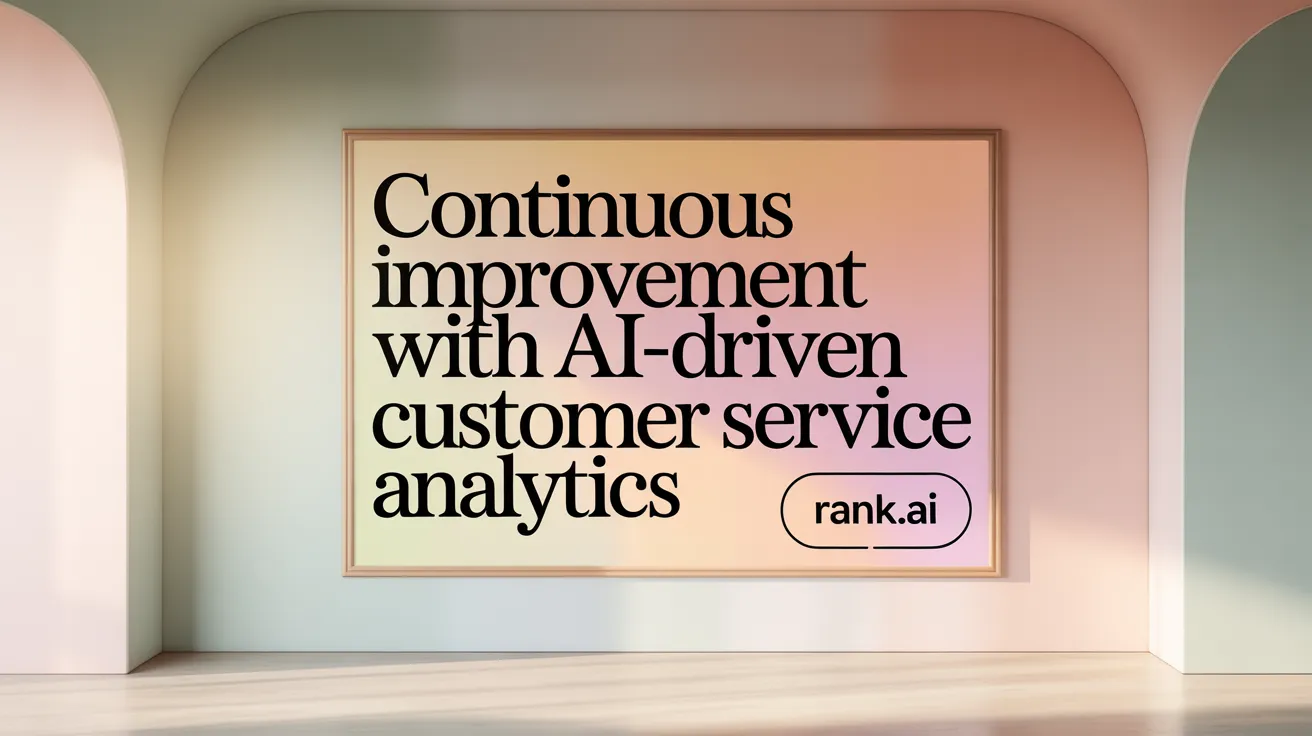
How AI supports real-time data collection and monitoring
AI-powered analytics platforms collect and process vast amounts of customer interaction data in real-time. This continuous monitoring allows businesses to understand customer behavior, website performance, and service effectiveness instantly. Automated data collection tools track key metrics such as response times, customer satisfaction scores, and issue resolution rates, providing a comprehensive view of service quality.
Quickly identifying service quality issues
With AI, organizations can detect problems as they happen. Advanced algorithms analyze data to spot anomalies—such as increased wait times or a rise in unresolved inquiries—promptly alerting support teams. This rapid identification helps prevent small issues from escalating, ensuring consistent service levels and a positive user experience.
Facilitating iterative improvements based on data
AI analytics foster an iterative approach to customer service enhancement. By analyzing ongoing data, teams can test changes, measure impacts, and refine their strategies continuously. This cycle of improvement ensures that service evolves in alignment with customer needs and expectations, ultimately boosting site performance and satisfaction.
Link between service quality and SEO metrics
High-quality customer service directly influences SEO rankings. Satisfied users are more likely to stay on a website longer, engage with content, and share positive feedback. AI-driven insights can identify correlations between service performance and key SEO metrics such as bounce rates, dwell time, and backlink quality, demonstrating how excellent service enhances search visibility.
Enhancing customer satisfaction and site performance
Implementing AI-based performance analytics results in increased customer satisfaction. Real-time insights enable personalized responses and proactive support, reducing frustration. Simultaneously, improved service quality leads to smoother website experiences, higher engagement, and better search engine rankings, creating a virtuous cycle of growth and trust.
How AI Accelerates Keyword Research and Content Creation for SEO Success

How does AI utilize NLP and predictive models in SEO?
AI leverages natural language processing (NLP) and predictive models to analyze search data, user queries, and competitor content. These tools identify patterns in search behavior, uncover emerging trends, and understand search intent, allowing marketers to develop targeted SEO strategies more effectively.
How does AI identify high-value and long-tail keywords?
AI algorithms evaluate search volume, competition, and relevance by analyzing vast datasets quickly. They focus on long-tail keywords with higher conversion potential, helping businesses target niche audiences and improve content relevance. This data-driven approach increases the chances of ranking higher in search results.
Can AI generate content outlines and drafts automatically?
Yes, generative AI tools like ChatGPT can craft detailed content outlines and full drafts based on selected keywords and audience preferences. These tools optimize structure, suggest relevant subtopics, and create engaging content, significantly speeding up the content creation process.
How does AI improve content relevance and search intent alignment?
AI analyzes user queries and intent signals to ensure content addresses specific questions and needs. By optimizing content for human readability and aligning it with search engine algorithms, AI helps improve rankings and user engagement.
How does AI save time and increase SEO efficiency?
AI automates repetitive tasks such as keyword clustering, technical audits, and content optimization. This automation frees up time for marketers to focus on strategic planning and creative activities. Additionally, AI’s rapid analysis capabilities enable quick adaptation to algorithm updates and emerging trends, boosting overall SEO productivity.
Optimizing Technical SEO with AI: Schema Markup, Site Speed, and Structured Data

How does AI automate technical audits and fixes?
AI tools can scan large websites to identify technical issues such as broken links, slow page load times, and missing meta tags. They quickly analyze data from various pages, provide detailed reports, and even suggest or automatically implement fixes. This automation saves time for SEO teams, enabling rapid response to problems that could negatively impact search rankings.
How is schema markup and structured data implemented with AI?
AI systems assist in adding schema markup and structured data to webpages by analyzing content and suggesting appropriate schemas—such as articles, products, or local business details. Some tools not only recommend schema types but also generate the necessary code snippets, making it easier to enhance search engines' understanding of page content.
How can AI improve Core Web Vitals metrics?
Core Web Vitals—like page loading speed, interactivity, and visual stability—are critical ranking signals. AI tools optimize images, minimize code, and prioritize resource loading to enhance these metrics. They monitor performance continuously, offering insights and automated adjustments that keep websites compliant with search engine standards.
What are the benefits for AI-driven content understanding and ranking?
Structured data helps AI algorithms better interpret webpage content, leading to improved indexing and ranking. Properly implemented schema markup enables AI-powered search engines to display rich snippets, answer boxes, and other enhanced features, increasing visibility and click-through rates.
Which tools support automation of technical SEO elements?
Several AI-empowered tools facilitate technical SEO automation. Examples include:
| Tool Name | Functionality | Additional Details |
|---|---|---|
| Alli AI | Automates schema markup, internal linking, and site speed Optimization | Integrates seamlessly with websites for real-time fixes |
| Semrush | Conducts technical audits, offers suggestions | Powered by machine learning for accurate diagnostics |
| ZipTie.dev | Monitors AI answer engines and brand mentions | Tracks how structured data impacts brand visibility |
Integrating these tools into your SEO workflow can significantly boost your site's technical health and search performance.
AI-Assisted Link Building Strategies to Enhance Website Authority and Rankings

How can AI help identify reputable backlink opportunities?
AI tools analyze vast datasets to find high-authority websites relevant to your industry. They evaluate domain strength, relevance, and trustworthiness, helping you target backlinks from reputable sources. These tools can sift through millions of sites quickly, pinpointing opportunities that might be overlooked manually.
How can analyzing competitor backlink profiles improve your strategy?
Using AI, you can dissect competitors' backlink profiles to discover where they earn their links. AI-driven tools map out their link sources, anchor text patterns, and link placement strategies. This insight allows you to seek similar or better opportunities, enhancing your site's authority.
How does AI optimize anchor text and link placement?
AI algorithms recommend the best anchor texts based on keyword relevance and natural language usage. They also analyze optimal link placement within your content for maximum impact. Proper anchor text and strategic placement ensure links contribute positively to your rankings without appearing spammy.
What is the impact of AI-driven link building on SEO signals?
Links remain a significant ranking factor, signaling authority and relevance to search engines. AI-enhanced link building ensures high-quality backlinks, improving your site's perceived trustworthiness. This process strengthens SEO signals and boosts visibility in search results.
Can you provide examples of AI tools that support link building?
Tools like Link Whisper automate internal and external link suggestions, while Paige evaluates backlink quality and relevance. These AI-powered solutions streamline outreach, monitor backlinks, and suggest strategies to bolster your website’s link profile efficiently.
| Aspect | AI Tool | Features | Best Use Cases |
|---|---|---|---|
| Reputable backlink discovery | Semrush, Link Whisper | Domain analysis, backlink gap analysis | Finding authoritative sites for backlinks |
| Competitor analysis | ZipTie.dev | Monitoring AI-driven mentions and backlinks | Tracking competitors’ link strategies |
| Anchor text optimization | Semrush, Alli AI | Keyword analysis, suggestion algorithms | Crafting natural, effective anchor texts |
| Link placement | MarketMuse | Content gap analysis, placement suggestions | Enhancing content structure for links |
| Monitoring and management | Paige | Backlink quality assessment, dashboard | Maintaining a healthy backlink profile |
Leveraging these AI tools makes the link-building process more efficient and strategic, ultimately leading to improved website authority and higher search engine rankings.
Case Studies: Leading AI SEO Tools Revolutionizing Customer Support and Optimization

Overview of Semrush, ChatGPT, MarketMuse, Yext, Alli AI, and ZipTie.dev
AI SEO tools are transforming how businesses optimize their websites and improve customer interactions. Semrush provides AI-assisted SEO functionalities such as content creation, competitor analysis, and visibility tracking. ChatGPT is widely used for content generation, troubleshooting, and strategic planning. MarketMuse specializes in AI-driven content planning, gap analysis, and automation of audits. Yext focuses on local SEO, leveraging AI to enhance structured data and generate effective landing pages. Alli AI automates technical SEO fixes such as schema markup and internal linking, streamlining website optimization. ZipTie.dev monitors AI-generated answers across search engines, tracking brand mentions, sentiment, and competitor performance.
Specific features optimizing SEO and support tasks
These tools incorporate features like keyword research using natural language processing, content suggestions, metadata optimization, and backlink analysis. Semrush’s Copilot feature offers actionable insights. MarketMuse provides automated content audits and gap analysis, while Alli AI handles schema markup and internal linking automatically. Yext's structured data capabilities boost local search visibility. ZipTie.dev tracks brand mentions in AI answer engines, helping firms manage their online reputation.
Measurable improvements in site rankings and user experience
Implementing AI tools leads to significant performance gains. Many users report faster content production, improved rankings, and enhanced user engagement. For example, brands utilizing AI-driven content optimization have seen higher click-through rates and better SERP positions. AI-powered technical fixes reduce site errors and improve Core Web Vitals, directly influencing user experience and search rankings.
How AI tools integrate into existing workflows
AI tools seamlessly plug into SEO and customer support workflows. Marketers and support teams use them to automate routine tasks like keyword clustering, technical audits, and backlink analysis. These tools generate reports and recommendations that teams incorporate into their strategies. For instance, integrations with platforms like HubSpot and Salesforce enable continuous monitoring and adjustment, elevating overall effectiveness.
Industry adoption statistics and growth
The adoption of AI SEO tools is rising rapidly. Studies show that 86% of marketers use AI for creative ideation, and most report substantial time savings and performance improvements. The industry is trending towards more comprehensive platforms, with GPT-based content generation and predictive analytics becoming standard. As AI continues to evolve, its role in SEO continues to expand, reshaping the landscape of digital marketing.
| Tool Name | Focus Area | Notable Feature | Industry Adoption Rate |
|---|---|---|---|
| Semrush | SEO analytics | Semrush Copilot, keyword clustering | High |
| ChatGPT | Content & Strategy | Content creation, SERP analysis | Growing |
| MarketMuse | Content planning | Gap analysis, automated audits | Increasing |
| Yext | Local SEO | Structured data, landing pages | Steady |
| Alli AI | Technical SEO | Schema markup, internal linking | Rising |
| ZipTie.dev | Brand monitoring | AI answer tracking, sentiment analysis | Emerging |
Measuring the Effectiveness of AI Automation in Customer Support and SEO
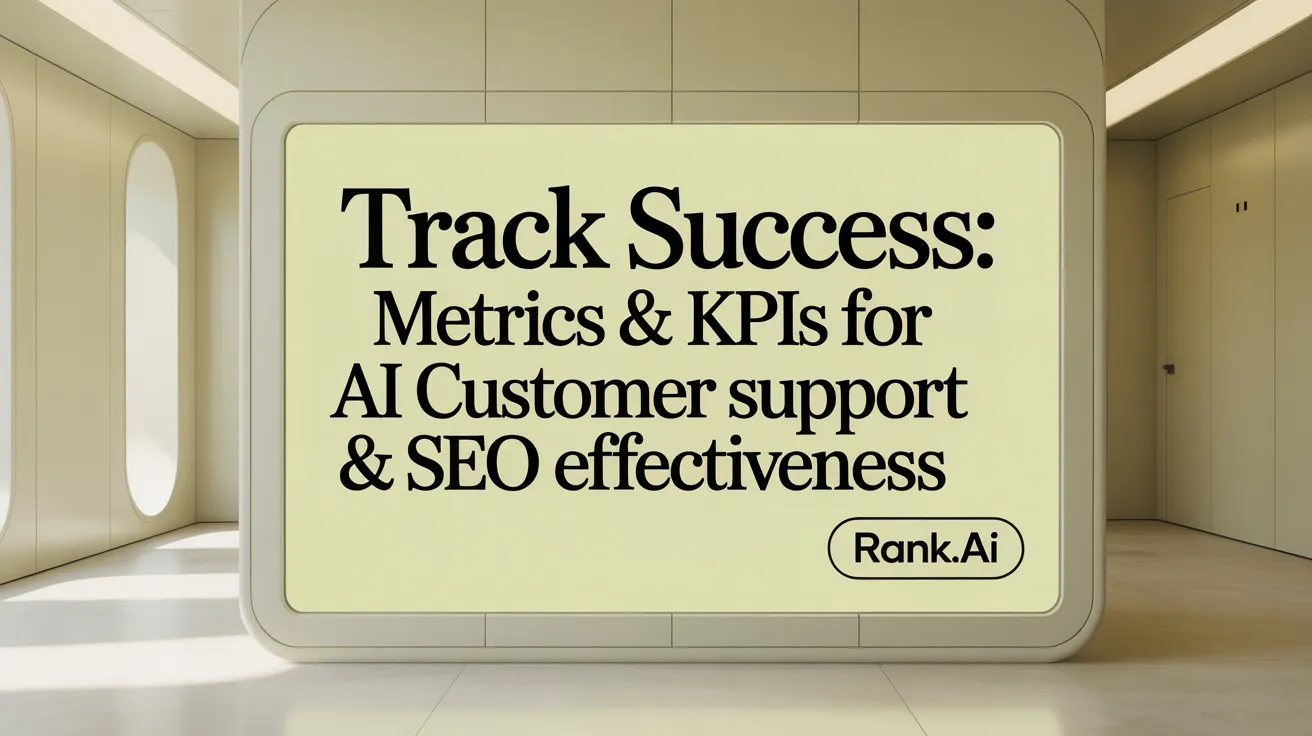
What are the key performance indicators (KPIs) for SEO and user engagement?
In AI-driven SEO and customer support, measuring success begins with identifying relevant KPIs. Common SEO metrics include search engine rankings, organic traffic volume, bounce rate, and conversion rate. These indicators reflect how well AI tools optimize content and attract users. For user engagement, metrics like session duration, page views per visit, and interaction rates on chatbots or help portals are critical. Tracking these KPIs helps evaluate AI's role in enhancing visibility and the user experience.
How is ROI analyzed for AI integration?
Return on Investment (ROI) quantifies the financial benefits of AI adoption by comparing the costs associated with AI tools against the gains in productivity, traffic, and revenue. Efficient AI automation reduces manual effort, speeds up content production, and improves ranking positions. Organizations often calculate ROI by examining increases in organic search traffic, lead generation, and customer satisfaction scores, alongside cost savings from automation.
How can improvements in rankings, traffic, and relevance be tracked?
Progress in search rankings is monitored through tools like Semrush or Yext, which provide real-time insights into keyword positions. Traffic data can be analyzed via analytics platforms such as Google Analytics, revealing trends over time. Relevance is assessed through engagement metrics and keyword relevance scoring, ensuring content continues to meet search intent and user needs. Consistent tracking allows for adjustments to AI strategies, maintaining competitive positioning.
What are feedback loops and how do they promote continuous optimization?
Feedback loops involve collecting performance data and user interactions to refine AI algorithms and content strategies. For example, analyzing which keywords generate conversions can inform future keyword clustering or content creation. Regularly reviewing metrics enables marketers to tweak AI settings, improve content relevance, and adapt to evolving search engine algorithms, fostering ongoing growth.
How should organizations balance automation with human oversight?
While AI automates numerous SEO and customer support tasks, human oversight remains essential for maintaining quality and trust. Strategic decisions, creative content, and complex customer interactions benefit from human judgment. Effective balance involves leveraging AI for routine tasks while dedicating human expertise to oversight, reviewing AI outputs, and making nuanced improvements. This synergy ensures optimal performance and user satisfaction.
Implementing a Structured Phased Approach to AI-Driven SEO and Customer Support Automation

Infrastructure setup and technology selection
Starting with a robust infrastructure is essential for effective AI-driven SEO and customer support. Organizations should evaluate various AI tools and platforms like Semrush, HubSpot, or Vendasta for compatibility, scalability, and specific features such as keyword analysis, content optimization, or sentiment analysis. Choosing the right technology stack involves assessing data security, integration capabilities, user interface, and support services. Cloud-based solutions often offer flexibility and ease of updates, which are crucial for staying current with evolving search engine algorithms.
Pilot testing and monitoring performance
After selecting suitable AI tools and establishing infrastructure, the next step is to conduct pilot testing. This involves deploying the AI systems on a small scale to evaluate their effectiveness in real-world scenarios. Metrics such as search rankings, website traffic, bounce rates, and user engagement are monitored closely. Continuous performance tracking enables teams to identify issues like inaccuracies in keyword targeting or deficiencies in content quality. This phase also includes adjusting parameters and refining algorithms based on the insights gathered.
Iterative improvement and feedback incorporation
AI systems thrive on feedback loops. Based on performance data and user feedback, marketers can tweak content suggestions, refine keyword strategies, and enhance technical SEO setups. Regular updates and iterations foster better accuracy and alignment with search engine guidelines. This ongoing process ensures the AI remains effective as algorithms evolve and new trends emerge, helping maintain or improve search visibility, website engagement, and customer satisfaction.
Project management and scaling strategies
Launching AI SEO and automation initiatives requires careful project management. Phased implementation—starting from pilot projects to full deployment—reduces risks and provides room for refinement. As success is demonstrated, organizations should develop scaling strategies, such as expanding AI applications across multiple websites or integrating more advanced features like Answer Engine Optimization (AEO) and Generative Engine Optimization (GEO). Establishing clear milestones, resource allocation, and dedicated teams ensures smooth scalability.
Ensuring alignment with SEO best practices and guidelines
Throughout each phase, it’s crucial to align AI-driven strategies with established SEO standards and ethical guidelines. This includes prioritizing content originality, transparency, user experience, and accessibility. AI tools should be used to complement human expertise, not replace it, ensuring that automation enhances overall SEO quality and trustworthiness. Regular audits, staying updated with algorithm changes, and adhering to industry best practices will help sustain successful AI integration.
The Future Outlook: AI Trends Shaping Customer Support and SEO Integration

How will Answer Engine Optimization (AEO) and Generative Engine Optimization (GEO) influence SEO?
As AI continues to evolve, new strategies like Answer Engine Optimization (AEO) and Generative Engine Optimization (GEO) are emerging. AEO focuses on structuring content so AI-powered answer engines can easily retrieve and present relevant information directly in search results. This means creating content that directly answers common questions or provides clear, authoritative data.
GEO aims at optimizing content for generative platforms that produce AI-crafted responses, such as chatbots and virtual assistants. Content must be tailored not only for search rankings but also to generate coherent, useful AI outputs.
These approaches demand that businesses think beyond traditional SEO practices, emphasizing clarity, relevance, and structured data that AI can interpret effectively.
What advances are occurring in voice and visual search optimization?
Voice search is expanding rapidly with the proliferation of smart speakers and voice-enabled devices. Optimizing for voice involves natural language keywords and longer, conversational queries.
Visual search, enabled by AI with image recognition capabilities, allows users to search using images rather than text. Optimizing for visual search includes high-quality images, alt texts, and structured data to help AI understand visual content.
Both trends require businesses to adapt their SEO strategies to capture these new types of queries and improve visibility across different channels.
How is there an increased focus on ethical AI and transparency?
As AI becomes more integrated into SEO and customer support, concerns around ethics and transparency grow. Trustworthy AI systems prioritize data privacy, avoid bias, and provide clear explanations for their outputs.
Transparency involves disclosing AI usage in customer interactions and content generation. This builds user confidence and aligns with regulations and industry standards.
Implementing ethical AI practices ensures sustainable growth and helps organizations differentiate themselves in a competitive landscape.
What is the future of AI-powered analytics and personalization?
AI-driven analytics will enable deeper insights into user behavior, search patterns, and content performance. Predictive analytics can forecast future trends and inform content strategies.
Personalization will become more sophisticated, delivering tailored experiences based on real-time data and user intent. This helps boost engagement, conversions, and customer loyalty.
Leveraging these tools allows businesses to stay ahead and dynamically adjust their SEO tactics based on continuous learning.
How should businesses prepare for future AI-driven SEO challenges?
Preparing for upcoming changes involves investing in AI tools, training teams on new technologies, and adopting agile strategies. Businesses should focus on high-quality, structured content, and technical SEO elements like schema markup and Core Web Vitals.
Regular testing and monitoring of AI-powered tools are essential to understand their impact and optimize accordingly. Developing a clear strategy for integrating AI into existing workflows ensures a smooth transition.
Adapting early will help organizations maintain search visibility and compete effectively in an AI-augmented digital environment.
| Trends and Focus Areas | Expected Impact | Implementation Tips |
|---|---|---|
| AEO & GEO | Enhances content relevance for AI answers | Focus on structured data, FAQs |
| Voice & Visual Search | Broadens reach across new channels | Use natural language keywords, optimize images |
| Ethical AI & Transparency | Builds trust and compliance | Disclose AI use, ensure data privacy |
| Analytics & Personalization | Deepens engagement and insights | Invest in predictive analytics, dynamic content |
| Preparing for New Challenges | Ensures ongoing competitiveness | Continual AI tool adoption, staff training |
Anticipating these trends and strategically adapting will position businesses to thrive in an AI-enhanced SEO landscape, ensuring they remain visible, trustworthy, and engaging in a competitive digital world.
Maximizing SEO Gains through AI-Automated Customer Support
Integrating AI-driven automation in customer support functions is not just a technical upgrade—it’s a strategic enabler of enhanced SEO performance. By enriching user engagement, personalizing interactions, and streamlining workflows, AI elevates both the quality of customer experiences and the strength of SEO signals. As AI tools continue to evolve, businesses that adopt these technologies thoughtfully and ethically will gain a competitive edge through improved search visibility and deeper customer loyalty. The journey toward AI-automated customer support integrated with SEO demands careful planning, ongoing measurement, and adaptation, but the rewards in efficiency and digital presence are substantial and well worth the investment.
References
- 14 best AI SEO tools & how I use them [new data]
- The Complete Guide to SEO Automation with AI
- AI for SEO: Your Guide for 2025
- 6 AI SEO Tools We Absolutely Love Using in 2025
- How to Use AI in Customer Service to Boost Engagement ...
- Ultimate AI SEO Guide for Beginners & Experts ...
- AI SEO Engineering: Data-Driven Search ...
- 30+ AI SEO Statistics You Should Know in 2025
- 12 Emerging AI Trends in Customer Service - 2025 AI ...
- AI Will Shape the Future of Marketing



